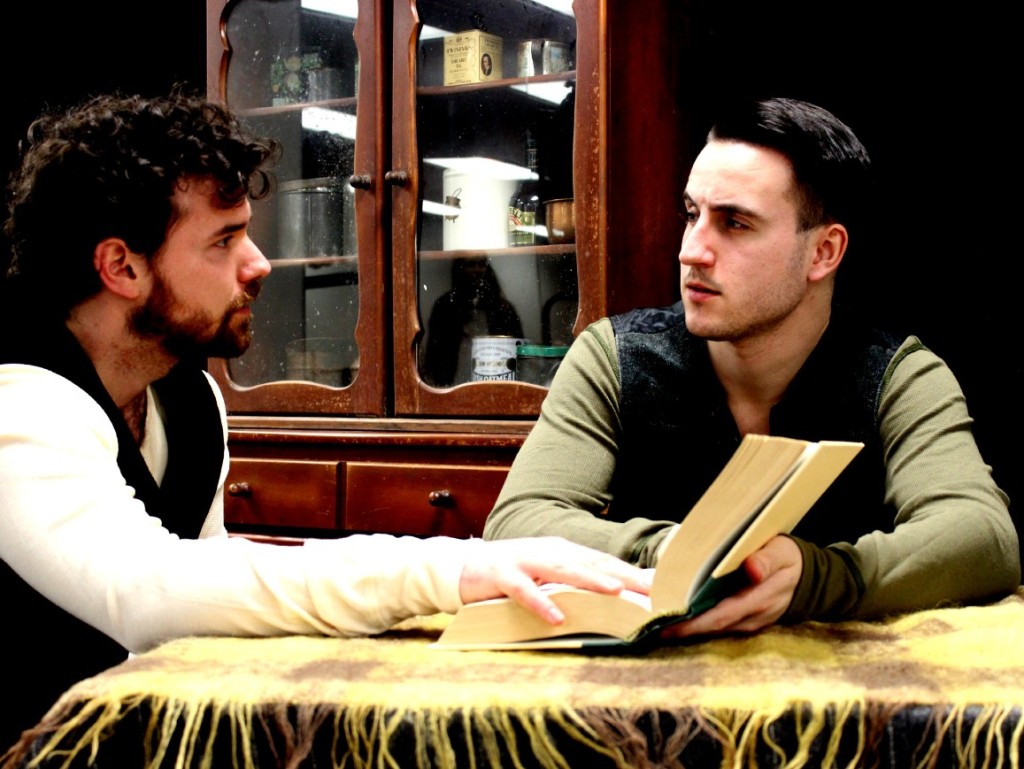
Heading to the Adrienne Theatre to see the Irish Heritage Theatre’s production of THE SHADOW OF A GUNMAN, I thought about how disconnected I felt from my own Irish heritage. Despite the fact that my great grandfather fought in the War of Independence as a member of the IRA, I never saw much worth in being Irish. I wondered what this play could offer me—a skeptical Irish American with no prior knowledge of Sean O’Casey’s work, who associated Irish culture with Shamrock Shakes and bar fights.
The play begins with the sound of keys tapping on a typewriter, leading us into a world we do not expect: The day to day struggles of working class Dubliners, the reality of the brutal War of Independence that ravaged their existence, the hopes and fears of life in Ireland between 1918 and 1921. We follow a single day in the lives of Donal Davoren (Dexter Anderson), a struggling, romantic writer, and Seamas Shields (Kevin Rodden), a fervent nationalist—two typical young men (messy, dreamy, aimless), sharing a room in a bustling Dublin tenement, struggling to pay the rent, while simultaneously dealing with the reality of living as outlaws in their own country, guilty of little more than being Irish.
In the first half of the play, Donal is mistakenly branded a “Gunman”—a fugitive member of the Irish Republican Army (IRA) whose job it is to fight, and if necessary, kill in the name of ending “the troubles” and liberating Ireland, a country firmly in the grip of the British Empire. He readily accepts the false mantle of IRA fugitive and slyly uses it to woo Minnie Powel (Josephine Patane)—a doe eyed young resident full of zeal for an Independent Ireland. Donal asks, “What danger can there be in being the shadow of a gunman?” It is precisely this naïve sentiment that sows the seeds for the tragedy to follow.
The first act comes off a bit like an Irish soap opera, replete with stilted movements and stiff dialog. Mournful Irish music and an eerie blue glow usher in the much darker and engrossing second act. While Seamus sleeps, Donal recites a few lines from Shelley’s Epipsychidion, “The cold chaste moon, the queen of heaven’s bright isles, who makes all beautiful on which she smiles.” We see the characters as poor Irish outcasts, struggling to make sense of the senseless world in which they live. Rodden soars in this dark atmosphere as the explosive door-to-door salesman, a poor Irish everyman who gives all men a bad name. His speech about a mysterious, ominous tapping is a testament to Rodden’s impassioned performance and O’Casey’s command of downtrodden Dublin slang.
Rodden personifies all the elements of the self-loathing and yet somehow boastful Irish man—a quick and cutting wit that hides a fragile and sensitive intellect. An attitude, no doubt, adopted in order to survive the unhinged and chaotic state that was life during this War of Independence.
It was this character that inspired a strange and foreign emotion in me—Irish pride. Not because he is perfect, but because he is so perfectly flawed. Finding a bomb hidden in their room brings out an unexpected suspense in which Donal and Seamus seem to thrive. In true Irish fashion, the two characters quip back and forth while being raided by British Black and Tans soldiers. I thought about my great-grandfather, perhaps living in the room next to them, waiting for his turn to be ransacked by British auxiliaries. I wondered, would he laugh, too? Would I?
The brilliance of this production, under the direction of Peggy Mecham, lies in its ability to casually take us from sunny and light-hearted to dark and heart-wrenching in a matter of moments. It shows us how life truly unfolded for these wonderfully damaged characters and how, in their world, there was no such thing as a white lie.
THE SHADOW OF A GUNMAN revealed a side of my heritage I had casually brushed aside, giving me a newfound appreciation for my ancestors and all they had to overcome so that I might enjoy the freedom they so desperately sought. My thoughts drift to the man who lived through the War of Independence and died mysteriously years later—my great grandfather, the shadow-less Gunman. I am happy for his sake that I saw this provocative play. Yet, as proud of him as I am, in a way I am happier to count myself among the same tribe as Donal and Seamus—just another flawed young man who happens to have an Irish last name. [Skybox at the Adrienne, 2030 Sansom St.] April 9-25, 2015; irishheritagetheatre.org.
- Read another Phindie review of THE SHADOW OF A GUNMAN.
